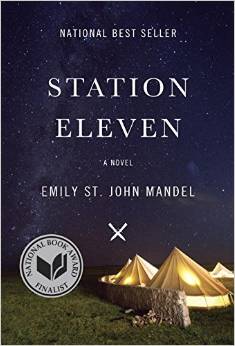 First, some things you should know about me, for like, context and stuff:
First, some things you should know about me, for like, context and stuff:
1. I usually avoid apocalypse books like the plague (or more apropos, the Georgia Flu). Most of the time, even thinking about apocalyptic situations makes me panic.
2. I am a Shakespeare nerd.
3. I am a Star Trek nerd.
4. I cannot explain why I loved this book so much, because most of my reaction was completely sub-conscious.
I have gotten gradually more stingy with my five star reviews since I have been writing real reviews for all the books I read and having to justify my feelings with words. That this was my first five star review of the year, I think, is pretty major. And that it came in February also says something. I really liked some of those books I read in January, but none of them were at the level with Station Eleven. This book just worked for me on every level, even despite my apocalypse phobia and the fact that I don’t normally enjoy literary fiction anymore.
Nominally, this book is about what would happen if 99% of the world died because of a flu-like illness and human civilization completely collapsed. But really, that’s not what it’s about. It’s about finding meaning and purpose in life. It’s about the purpose of art in human lives, why we create it and why it endures. It’s about the fragility of human memory. It’s an elegy for everything lost that we can no longer remember.
It’s also weirdly optimistic for a book about the end of human civilization, which is in the end why I think I could enjoy it so much. This isn’t a story about how humanity is doomed to fuck itself over. It’s a story about how we make lives worth living no matter what the conditions. As pretty much every review of this book I’ve read has mentioned, there’s a reason the traveling symphony in this book has the words “Survival is insufficient” painted on their wagon, and is tattooed on one of the character’s arms (the quotation is taken from an episode of Star Trek: Voyager–thanks, Seven of Nine).
I’m not going to say more than this because I have too many feelings. Just know that even if you don’t normally go for this kind of book, there’s a chance you will like (or love) this anyway.
